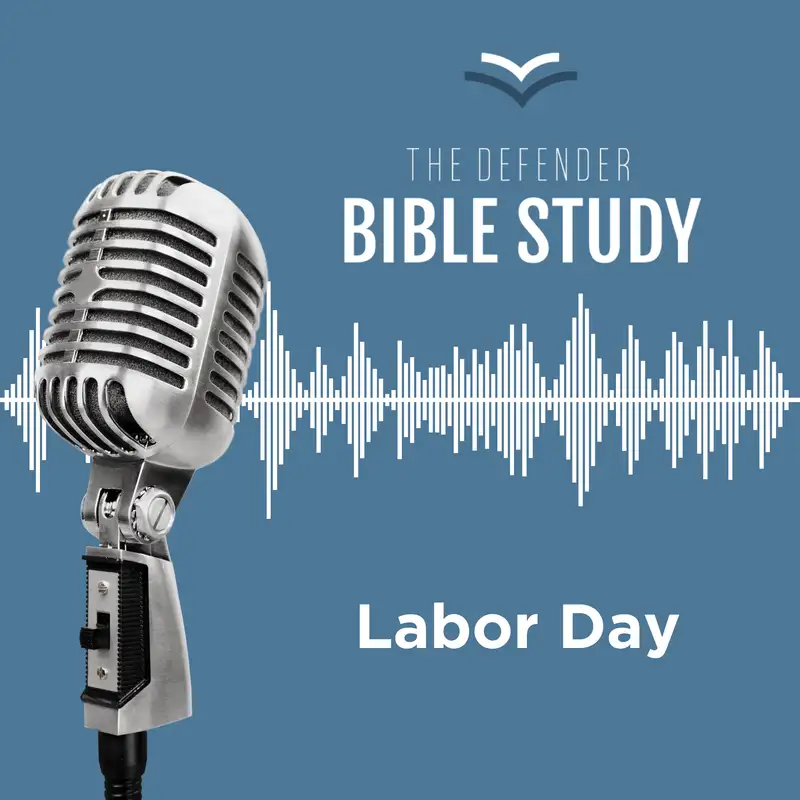
Labor as Worship: A Biblical Perspective on Work
Welcome to the defender bible study. A weekly encouragement to equip the body of Christ through the study of scripture and prayer to manifest the gospel to orphans and vulnerable children around the world. This podcast is a ministry of Lifeline Children Services, where we believe that defending the fatherless begins by being rooted in God's word.
Rick Morton:Hey there. Today is September 2, 2024. I'm Rick Morton, and this is the Defender Bible Study. Well, happy Labor Day. Excited to be with you on this Labor Day as we get a chance to spend a little bit of time.
Rick Morton:We're gonna be stepping outside of our normal study. And today, we're going to be talking a little bit about labor and work. And so just set a little historical context for the day that we're celebrating today. Labor Day wasn't always about barbecues and ball games and all the things that we get involved in over the course of the Labor Day holiday. Back in the 1880s, it was invented because manufacturing workers were working 70 hour weeks and spending too much time on the job.
Rick Morton:It was a way to celebrate American workers with a day off and and to acknowledge the fruit of their labor. Today things have changed dramatically. It seems like the, as the 80s song says, everybody's working for the weekend. Our society seems to have adapted our work ethic and changed and that we work and do our work to earn time to play. We work to play.
Rick Morton:Here on the Defender Podcast on this Labor Day, we want to take just a few minutes to consider work from a biblical perspective. And so I want you to consider 3 ways that the Bible shows us to regard work from a Christ centered perspective. The first thing that we see in the scriptures is that work is ordained by God. From the very beginning, we see, God is a God of work. Work's part of the character of God.
Rick Morton:His creativity and His productivity are part of who He is. If we're gonna understand God fully, we must see Him as a worker, and we must contemplate what that means both about Him and also what it means for us. In the Genesis account of creation, we learned some important things about God and about what He values. In Genesis 116, God is described as one who makes, And in verse 26, He's presented as one who forms. And we see throughout Genesis 1 that God is that God's work is good.
Rick Morton:We see that in verses 4, verses 10, 12, 18, 21, and 25 of Genesis 1, all affirming that throughout the creation narrative that everything that God did was good. And so we see that the product of God's work doesn't just meet the standard. The product of God's work is the standard. God's work is the standard. Everything he does by his effort is excellent, and it's exactly as it should be.
Rick Morton:And that tells us a lot about, about how we're made and about the work that we do in reflecting our Creator. So the second thing we see about work is that God made us to work. God gave mankind the responsibility to care for creation by subduing it, ruling over it, and by seeing that it produced and that it flourished. In Genesis 2:15, Adam was placed in the garden, and we see that he was placed there to tend it and to keep it. Now we recognize that sin makes our work harder and less fruitful.
Rick Morton:We see that in Genesis 3, 17 through 19 after the fall, when we see that the ground cursed as a result of our sin. Sin also introduced laziness and the compulsion to escape from work. Before the fall, Adam and Eve didn't live for the weekend or look to find ways to be inactive. They worked regularly as part of their lives, to the glory of God, and they were perfectly fulfilled by their work. Work was a part of every day, except the 7th day when they rested because they were emulating the character and the pattern of God.
Rick Morton:And so that's what we want to strive for. And that's what in part the gospel has come to redeem. Jesus in in Jesus our work, is fulfilling. And through Jesus, we can find the resolve to work and the joy to work. And that we, when we do that, we're ultimately reflecting something about the character of our Creator, and we're demonstrating to the world who our God is and what He's like when we work to the glory of God.
Rick Morton:And so the third thing, and that kind of brings us to the third thing that we see in the scriptures, which is that actually our work is an act of worship. And while we can say that we don't work in order to gain the favor of God. Our works don't somehow fill the bucket enough to be able to please God and to make up for our sin, what we do see is that in Christ, that once that the part of being redeemed is that we live in a condition where we're able to work and our work is pleasing to God. So what the good news does, the good news of Jesus' rescue and His transformation, what does that do for us regarding our work? Well, we find the answer in Colossians 3 23 where Paul says to the church at Colossae, Whatever you do, work heartily.
Rick Morton:Ask for the Lord and not for men, knowing that from the Lord you will receive the inheritance of your reward. You are serving the Lord Christ. In other words, when we work, we're not working for our boss. We're not working for a paycheck. We're not working to deserve the weekend.
Rick Morton:When we work, we we do what we do. We wanna do it with excellence and purpose because because at the end of the day, we're doing what we do because because we're doing it unto Christ. And we're doing it unto our heavenly father, knowing that that our inheritance and our reward is not our paycheck. It's not what we get as a result of work. But it's not even at the hands of men.
Rick Morton:But ultimately, we're doing what we do, to please God and ultimately to show Him our love for Him. Martin Luther King Jr. Was talking to a group of, I believe, middle schoolers at a middle school in Philadelphia when he summed it up, perhaps in the best way, he said, If it falls to your lot to be a street sweeper, sweep streets like Michelangelo painted pictures, like Shakespeare wrote poetry, like Beethoven composed music. Sweeps streets so well that all the hosts of heaven and earth will have to pause and say, Here lived a great street sweeper who swept his job well. We need to see our our work as an act act of worship done unto Jesus and done for His fame and for His glory, not merely our own obligation.
Rick Morton:When we recognize the way we work and pursue our work in a way that glorifies God, we will work differently. Remember, the quality of our work, our attitude about it, and the motivation behind it should show people who God is. On this Labor Day, let's remember that work is good, that work is hard, and that work is an opportunity to reflect the character of God, to commune with the heart of God, and to worship God with our effort. I pray that you'll enjoy the rest of your day and some pause from your labors as we celebrate the ability to work and our call to do it unto the Lord. Thanks for joining us on the Defender Bible Study.
Rick Morton:We'll be back right here next week again as we continue our study right here.
Herbie Newell:Thanks again for joining us for the defender bible study. If you enjoy making this podcast a part of your weekly routine, we'd love for you to take a moment to subscribe, rate, and review the defender bible study to make it easier for more people to find. For more resources and information on how you and your church can partner with Lifeline, please visit us at lifelinechild.org. Follow us on Facebook, Instagram, or Twitter by searching for Lifeline Child. You can email us directly at info at lifelinechilddot org.
Herbie Newell:We look forward to seeing you again next week for the Defender Bible Study.
Creators and Guests
